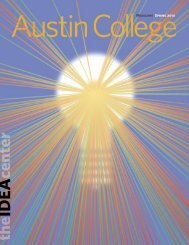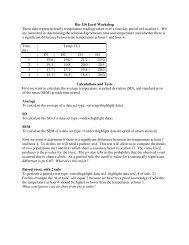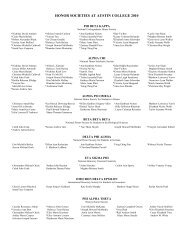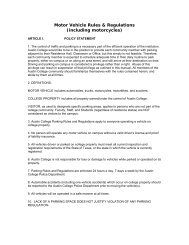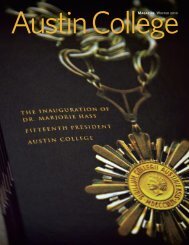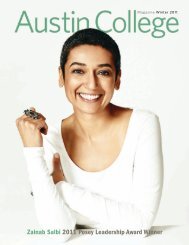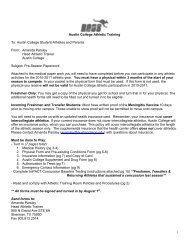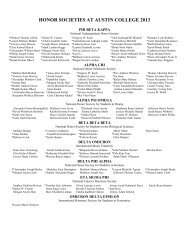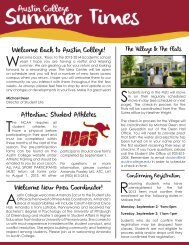PHILOSOPHYinclude both disciplines. The major inreligious studies and philosophy consistsof ten course credit units approvedby both departments (usually consistingof a five/five distribution), to be chosenfrom offerings in both fields accordingto the interests of the student. The studentmust take two 300-level or abovecourses in both Philosophy and ReligiousStudies (four total).A minor in philosophy consists of fivecourse credit units in philosophy withat least three courses numbered 200or above.A minor in ethics consists of fivecourse credit units in philosophy, normallytaken from the following list:205, 207, 209, 213, 302, 307, 314,and 105 (if not taken after any of theother courses in this list). Approvedtopics courses may also count, butstudents should consult the instructorto determine whether a course is appropriatebefore enrolling in it.105 Introduction to PhilosophyAn introduction to such basic problems in philosophyas the relationship between mind andbody, freedom of the will, skepticism and thenature of knowledge, personal identity, God andthe problem of evil, and the demands of morality.Includes an introduction to techniques of criticalthinking and arguing. (Each fall and spring)110 Modern LogicA study of the formal structure of argumentationfrom Aristotle to the present with primaryemphasis on modern symbolic logic. (Each year)203 Philosophy and ArtAn examination of various accounts of art fromPlato and Aristotle to the present. Topics coveredinclude: art and truth; the peculiar kindof being of works of art; objectivity in meaningand interpretation of art; feminist, postmodernand multicultural criticisms of traditional aesthetictheory. (Fall <strong>2007</strong>, Spring 2010)205 EthicsA critical analysis of ethical theory, including(but not limited to) consequentialism, egoism,relativism, religious ethics, feminist ethics,virtue ethics, and deontological ethics. (Spring2009, Fall 2010)207 Environmental EthicsAn examination of ethical issues that involve theenvironment with an emphasis on prominentmoral theories that have been used to addressthem, including traditional consequentialism,animal welfare approaches, biocentric theories,the Land Ethic, and deep ecology. (Each spring)209 Ethics and MedicineAn exploration of ethical issues that arise in thepractice of medicine and the health sciences,including such issues as euthanasia, abortion,cloning and other forms of artificial reproduction,eugenics, and technologies for enhancingmind and body. (Each fall)211 Feminist Thought and Its CriticsA survey of different types of feminist theory(conservative and liberal feminists, Marxistfeminists, radical feminists, psychoanalyticfeminists, postmodern feminists, multiculturalfeminists, ecofeminists, etc) and an explorationof both internal and external critiques of thesetheories. (Spring 2009, Spring 2010)213 Law and MoralityAn examination of the complex relationshipbetween law and morality. Topics include issuesin philosophy of law (What makes somethinga law? Is the threat of punishment theonly reason to follow a law? Is an immoral lawstill a law?) and legal ethics (Can a lawyer lie?If a lawyer knows a witness is telling the truth,can she cross-examine that witness to make itappear the witness is lying? How can a lawyerprotect a client he knows is guilty?) (Spring2009, Spring 2010)220 Ancient and Medieval PhilosophyAn examination of Ancient Greek, Hellenistic,and Medieval philosophy, with special emphasison Plato, Aristotle, Augustine, and Aquinas.(Each fall)225 Early Modern PhilosophyAn examination of philosophical issues in theearly modern period, with an emphasis on theworks of Descartes, Leibniz, Locke, Spinoza,Berkeley, Hume, and/or Kant. (Each spring)230 Contemporary PhilosophyAn examination of 19th and 20th-century philosophyto the present, with special attentionto analytic, existentialist, pragmatist, and postmodernistpositions. (Each fall)COURSES OF INSTRUCTION| 131
PHILOSOPHY250 Topics in PhilosophyA study of a topic in philosophy that is of broadinterest to undergraduates. May be repeatedwhen topic varies.260 Intermediate Directed Study(Variable course credit)302 Ethical TheoryAn extended, in-depth look at ethical theory.Topics may include the relationship betweenwhat is good and what is right; the role ofreason and emotion in ethical judgment; thepossibility of moral knowledge; the nature ofmoral judgment, etc. Prerequisite: Junior withat least two philosophy courses or instructorpermission. (Fall <strong>2008</strong>)306 Knowledge and RealityA study of issues involving knowledge, includingscientific knowledge, and its relation to theworld. Topics may include skepticism; justification;the nature belief; observation; explanation;the basis, development, and validation oftheories; laws; causation; realism; and distinguishingscience from nonscience. Prerequisite:Junior with at least two philosophy coursesor instructor permission. (Fall <strong>2008</strong>, Fall 2010)307 Environmental EthicsAn in-depth investigation of ethical theories thathave been developed to address environmentalconcerns. Theories studied typically includetraditional forms of consequentialism, animalwelfarism and animal rights theories, biocentricethics, the Land Ethic, deep ecology, socialecology, and ecofeminism. Prerequisite: Juniorwith at least one previous philosophy courseand Environmental Studies 235. (Each spring)308 MetaphysicsAn examination of issues concerning the ultimatenature of reality. Topics may includeidentity (especially personal identity), freedom,existence, color, time, causation, and realism/anti-realism controversies. Prerequisite: Juniorwith at least two philosophy courses or instructorpermission. (Fall <strong>2007</strong>, Spring 2009)310 Mind and LanguageAn examination of the relation between linguisticnotions such as meaning, reference andcommunication and such psychological notionsas intentionality, consciousness, personhoodand the explanation of behavior. Topicsmay include: mind-body dualism, functionalismand artificial intelligence; semantic indeterminacyand knowing Other minds; speechacts and conversational implicature; biologicalevolution of thought and language; dysfunctionalminds and language-users; religiouslanguage. Prerequisite: Junior with at least twophilosophy courses or instructor permission.(Spring 2009, Fall 2010)312 Philosophy of ReligionA critical, synthetic approach to the classicalproblems in philosophy of religion that encouragesstudents to develop tentative conclusionsof their own by working through a wide range ofphilosophical alternatives to each issue. Prerequisite:Junior with at least two philosophy coursesor instructor permission. (Fall <strong>2007</strong>, Fall 2009)314 Social and Political PhilosophyAn examination of various theories of justice,equality, liberty, and rights from Plato and Aristotleto modern liberalism and their feminist,postmodern and multicultural critics. Specialtopics may include debates over church-stateseparation, affirmative action, reparations, disabilityrights, homosexual rights, language andother rights of ethnic minorities. Prerequisite:Junior with at least two philosophy courses orinstructor permission. (Spring <strong>2008</strong>, Fall 2009)350 Topics in PhilosophyA study of a topic in philosophy that is of interestto students with a background in philosophy.May be repeated when topic varies. Prerequisite:Junior with at least two philosophycourses or instructor permission.360 Directed StudyA study of a topic in philosophy that is of interestto students with a background in philosophy.May be repeated when topic varies. Prerequisite:Junior with at least two philosophycourses or instructor permission.450 Advanced Topics in PhilosophyA critical examination of a major philosopher,philosophical movement, or philosophical issue.May be repeated when topic varies.460 Advanced Directed Study(Variable course credit)464 Teaching/Learning ParticipationAn individualized study that includes sharingin the instructional process for a particularphilosophy course under the supervision ofthe faculty member teaching the course. Openonly to certain highly qualified juniors andseniors by invitation. (Additional details givenin the section on Other Learning Opportunities.)132 |COURSES OF INSTRUCTION



